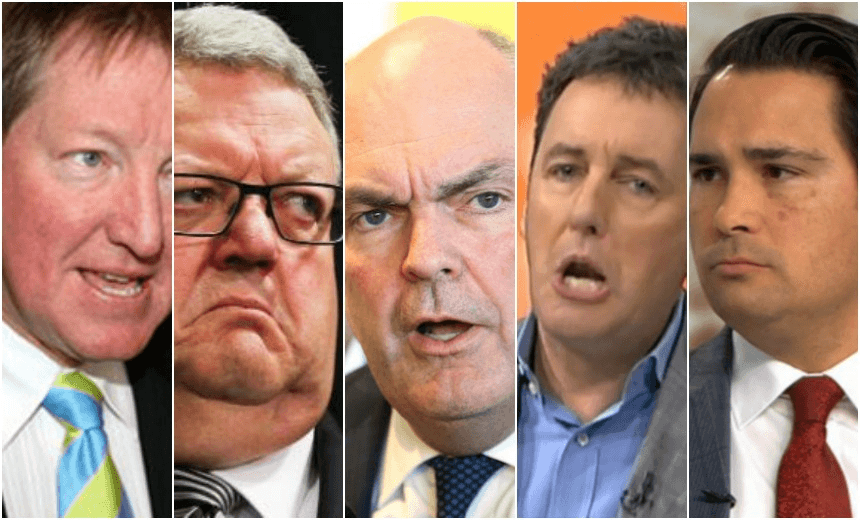It’s just been a very bad start to the week from the government when it comes to statements on transport and housing, weeps Hayden Donnell.
National has a long and proud tradition of being wrong about everything when it comes to Auckland. Its ministers have consistently had to be dragged screaming out of the 18th century to back any borderline sensible transport project in the city. Gerry Brownlee spent years angrily weeping at the sound of the words “City Rail Link”. Steven Joyce can’t get to sleep unless he funds at least three economically unfeasible roading projects in Wellsford every afternoon. The party’s approach to housing has been equally stroke-inducing. Nick Smith once said he wants to make Auckland’s houses more affordable without making them cheaper. He refuses to support any of these good ideas:
* A housing warrant of fitness
* A capital gains tax
* Jailing all Boomers
* Regulation to combat negative gearing
But even by those standards, National’s last 48 hours have been discouraging. They began with Joyce, now our finance minister, calling someone a “public transport activist ????” on Twitter.
It’s sad that Joyce still sees paving everything except human skin and golf courses as a mainstream transport philosophy. By now, politicians shouldn’t be looking at advocates for trains, buses, cycleways, and pedestrianised streets like they’re locust-eating radicals. Calling someone a “public transport activist” should be like calling someone a “cheese-loving insurgent” or a “Daily Blog hating revolutionary”. Pro-public transport belief should be seen as normal.
Maybe Joyce has been listening to state propaganda department Mike Hosking. National’s highest-ranked non-MP recently posted a Mike’s Minute where he concludes only 2% of New Zealanders use public transport. “Here’s some truth,” he says. “We don’t like buses. We don’t like public transport. We like cars. And cars need roads.”
There are a few things to note here: Hosking is using nationwide public transport stats. Those include figures for New Zealand’s small towns, where public transport is a choice between catching buses that arrive roughly twice annually or getting a piggyback from Tim Shadbolt.
Comparing that to Auckland is criminal stupidity. It’s like saying London’s Underground is useless because people don’t use enough trams in the outer suburbs of Berwick-upon-Tweed.
But more than that, the reason we seem to like cars, and roads, is because our government is run by people like Joyce and Hosking, who love building roads, and driving cars. When given the opportunity, New Zealanders use public transport. Look at the success of our small concessions to sensible transport planning. The Northern Busway now carries half of all commuters from the North Shore at peak times. Trains are now so packed at rush hour that people are literally fusing together during their journeys. This might sound crazy, but what if our transport choices are in some way a reflection of government’s transport planning priorities?
Anyway, Mike is meant to be an idiot. Simon Bridges is supposed to be smart. He signed the public transport-infused Auckland Transport Alignment Project with outgoing karaoke star Len Brown last year.
But lately he’s been showing signs of strain. It started with a weird performance in Parliament, where he defended the undeniably terrible East-West link by getting extremely petty with Green MP Julie Anne Genter.
Today he talked to the Herald about possible improvements to Auckland’s infrastructure ahead of the America’s Cup in 2021. Could we get rail to the North Shore? Rail to the airport? Literally anything to do with rail? Probably not, said Bridges, but a section of motorway may be widened.
Meanwhile, Nick Smith gave an equally depressing interview to Radio New Zealand. He conceded some vaguely forgivable stuff about affordable housing quotas in Special Housing Areas, then got worked up at Guyon Espiner for asking whether he’d done enough to get affordable houses on the market, arguing convincingly he’s “not a miracle man”. He went on to say he was encouraged that house prices in Auckland had flattened out at a cool median price of $865,000, which is virtually nothing if you compare it to the cost of buying a solid gold Lamborghini or setting up a habitable base on Mars. It was both one of Smith’s better interviews, and a supremely sad reminder of the dire predicament facing everyone in the city earning less than $2333 a week.
If $650k is affordable and affordable is defined as repayments being no more than 30% of income, how many are earning $2333 per week? pic.twitter.com/pHUxRNM6dd
— Bryce Pearce (@Brycepearce) July 3, 2017
Of course none of this matters. National are still polling 3000%. Andrew Little always looks like he’s about to simultaneously give voters a parking ticket and the cane. We’re likely in for at least three more years of slightly backward, and occasionally mind-liquifyingly dumb transport and housing policy. The question is though, why does it have to be like this? Why can’t we have nice things? Why can’t we be like every other functional major city in the world, and base ourselves around dense housing and a decent public transport system? It seems incredibly annoying, but I’m probably being uncharitable. After all there are much bigger crises facing Auckland than just broken transport and housing.
This content is brought to you by LifeDirect by Trade Me, where you’ll find all the top NZ insurers so you can compare deals and buy insurance then and there. You’ll also get 20% cashback when you take a life insurance policy out, so you can spend more time enjoying life and less time worrying about the things that can get in the way.
This election year, support The Spinoff Politics by using LifeDirect for your insurance. See lifedirect.co.nz/life-insurance





